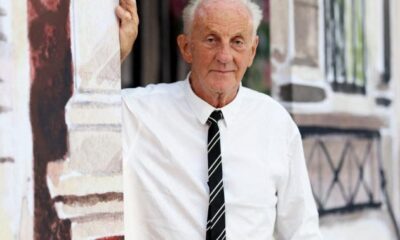Health
British Model Chloe Ayling Kidnapped for Human Trafficking

In July 2017, British model Chloe Ayling was kidnapped in Milan, Italy, during what she believed was a photo shoot. Shortly after her arrival, two masked men abducted her, injected her with ketamine, and concealed her in a holdall in the trunk of a car. Ayling’s ordeal lasted six days, during which she was held captive in a remote farmhouse.
Ayling’s captors sent a chilling ultimatum to her agent, demanding £300,000 for her release or threatening to auction her as a sex slave on the dark web. The email, allegedly from a “mid-high-level contract killer,” included a disturbing advertisement featuring Ayling’s physical details alongside photos of her in swimwear. The case, which garnered widespread media attention, highlighted the dark realities of human trafficking.
Captivity and Release
After six harrowing days, Ayling was released. Her case quickly became mired in controversy as she faced skepticism and suspicion from the public and media. Many questioned the authenticity of her story, contributing to the emotional toll of her experience. A detective superintendent involved in the investigation remarked, “I’ve seen dead people who looked in a far better condition,” indicating the severity of the situation Ayling faced.
The perpetrator, identified as Łukasz Herba, a 30-year-old Polish computer programmer from the West Midlands, was later described in court as “a fantasist with narcissistic tendencies.” His actions raised questions about the motivations behind such a heinous crime and the ease with which individuals can exploit vulnerable individuals.
Impact on Victims and Society
Ayling’s case serves as a grim reminder of the threats posed by organized crime and human trafficking. Despite her eventual release, the psychological scars from such experiences can endure long after the physical captivity has ended. The public’s initial disbelief of Ayling’s story reflects broader societal issues concerning victim-blaming and the stigma surrounding survivors of such traumatic events.
Authorities have emphasized the importance of believing victims and addressing the realities of human trafficking in order to prevent similar incidents in the future. Ayling’s experience has sparked discussions about the need for better protection and support systems for individuals at risk of trafficking.
As the investigation unfolded, it became clear that Ayling was not alone in her plight. Human trafficking is a global issue, affecting countless individuals each year. Awareness and education are crucial in combating this crime, as is the necessity for law enforcement to take such threats seriously.
Chloe Ayling’s story, while tragic, has also become a catalyst for change, highlighting the urgent need for action against human trafficking and the importance of supporting victims as they navigate the complex aftermath of such traumatic experiences.
-

 World2 weeks ago
World2 weeks agoPrivate Funeral Held for Dean Field and His Three Children
-

 Top Stories2 weeks ago
Top Stories2 weeks agoFuneral Planned for Field Siblings After Tragic House Fire
-

 Sports3 months ago
Sports3 months agoNetball New Zealand Stands Down Dame Noeline Taurua for Series
-

 Entertainment3 months ago
Entertainment3 months agoTributes Pour In for Lachlan Rofe, Reality Star, Dead at 47
-

 Entertainment2 months ago
Entertainment2 months agoNew ‘Maverick’ Chaser Joins Beat the Chasers Season Finale
-

 Sports3 months ago
Sports3 months agoSilver Ferns Legend Laura Langman Criticizes Team’s Attitude
-

 Sports1 month ago
Sports1 month agoEli Katoa Rushed to Hospital After Sideline Incident During Match
-

 World3 weeks ago
World3 weeks agoInvestigation Underway in Tragic Sanson House Fire Involving Family
-

 Politics2 months ago
Politics2 months agoNetball NZ Calls for Respect Amid Dame Taurua’s Standoff
-

 Top Stories2 weeks ago
Top Stories2 weeks agoShock and Grief Follow Tragic Family Deaths in New Zealand
-

 Entertainment3 months ago
Entertainment3 months agoKhloe Kardashian Embraces Innovative Stem Cell Therapy in Mexico
-

 World4 months ago
World4 months agoPolice Arrest Multiple Individuals During Funeral for Zain Taikato-Fox





















